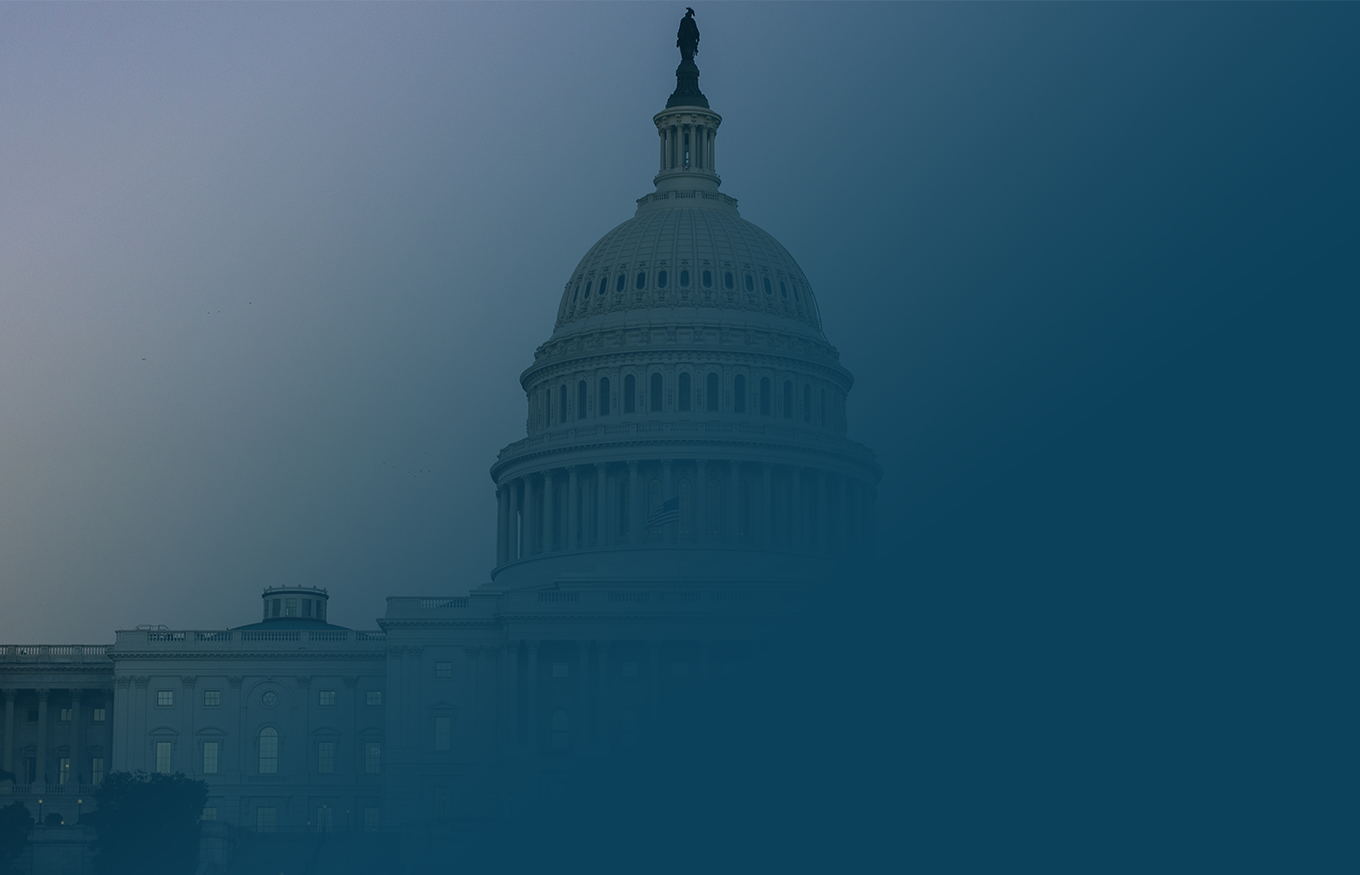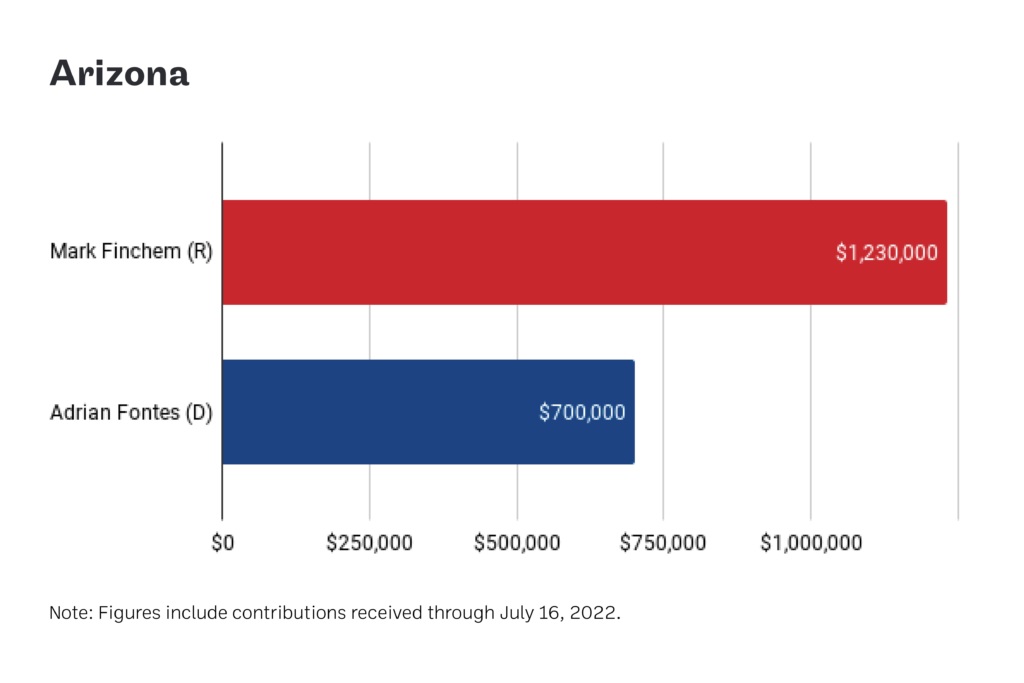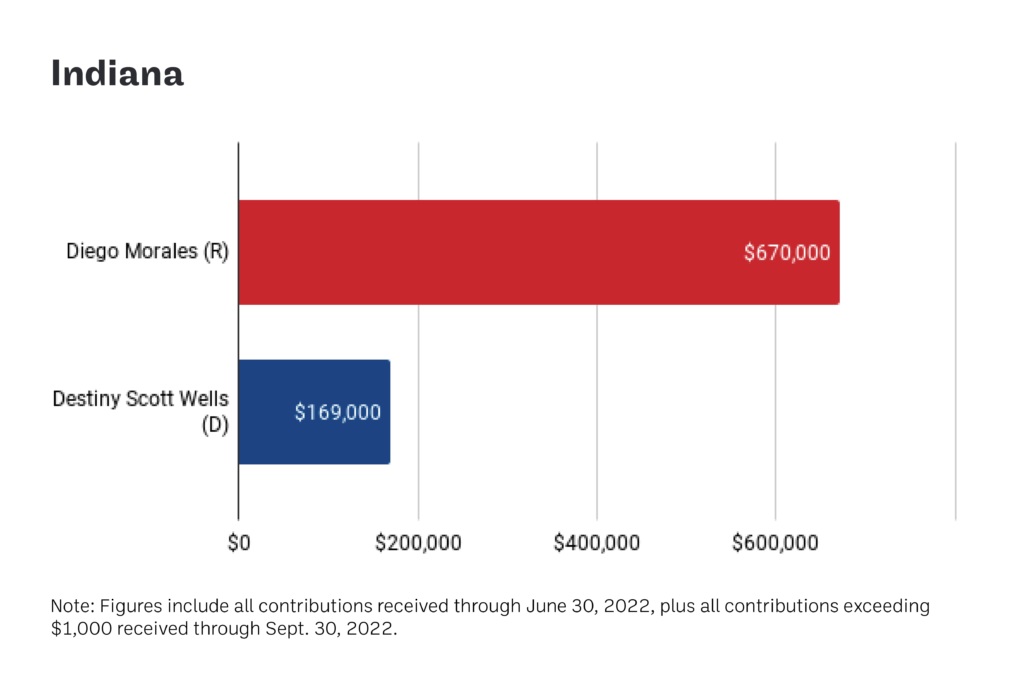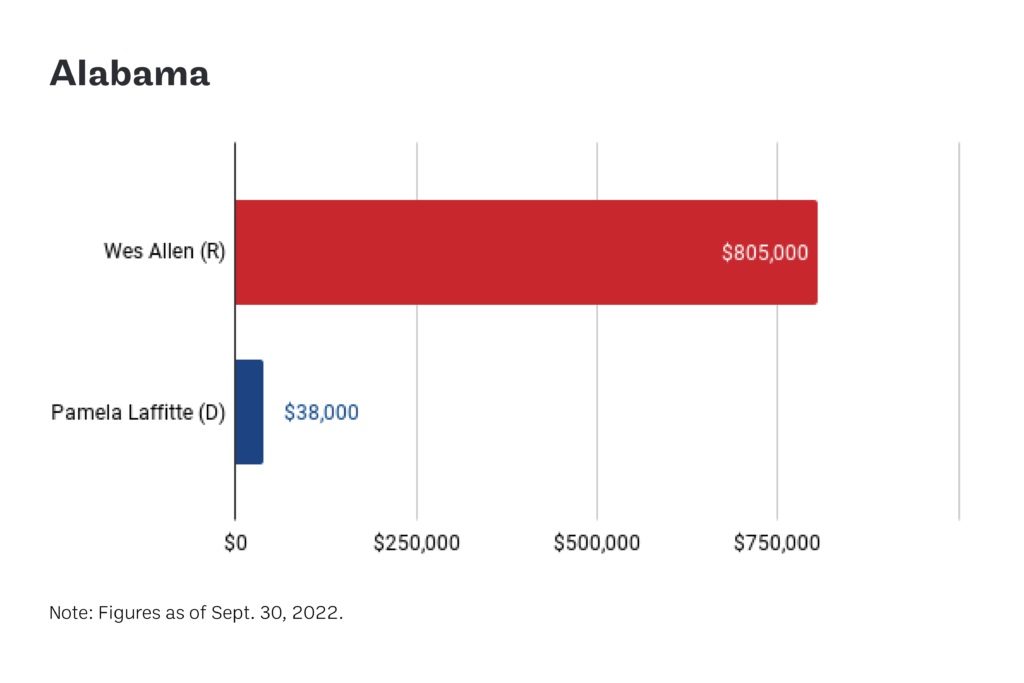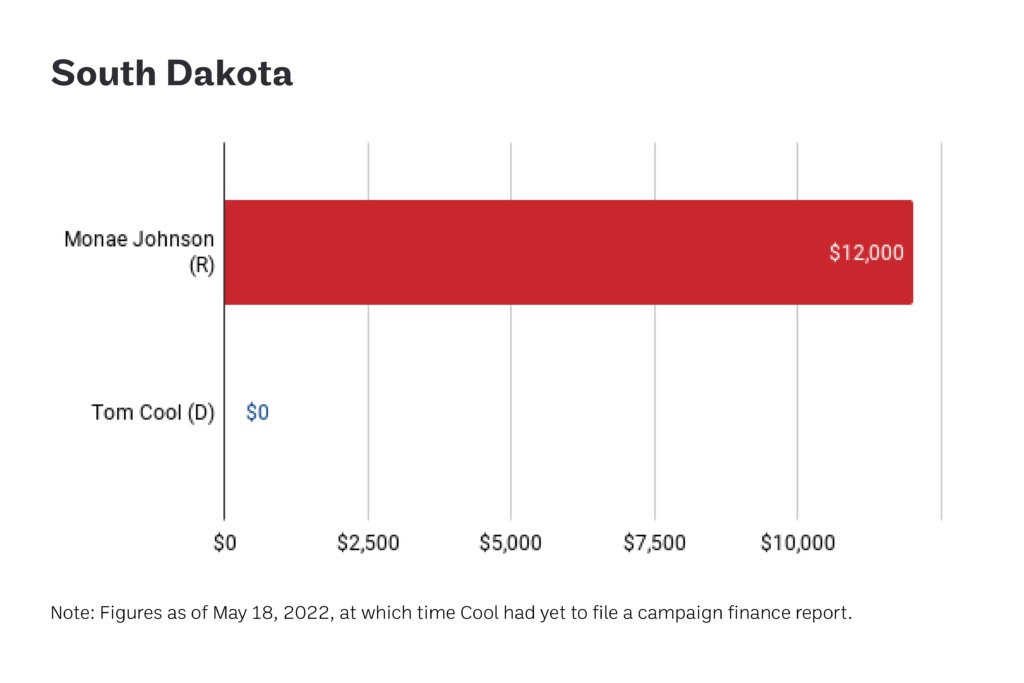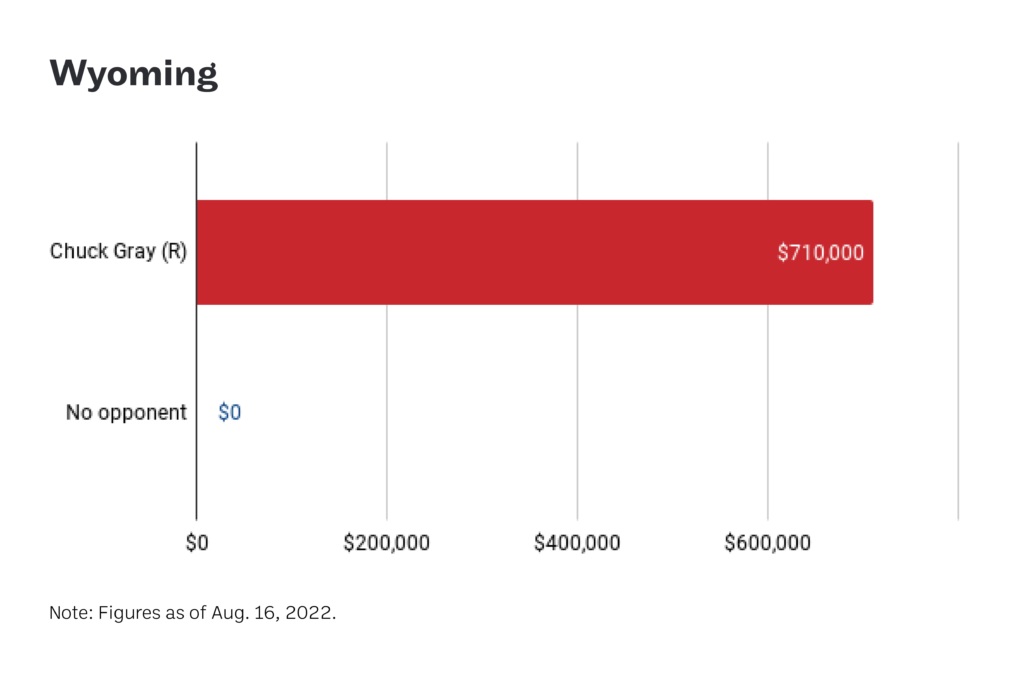Some of the funds these candidates have raised came from former President Donald Trump’s Save America PAC. Money has also come from Trump’s allies in the election denier movement, including two individuals who participated in the fake elector scheme in 2020, as well as everyday Americans who made small contributions.
Down-ballot races like secretary of state contests don’t usually get as much attention from voters — or donors — as higher-profile races, like congressional or gubernatorial elections. That’s one reason why a contribution of a few hundred dollars — or a few thousand dollars — can be so meaningful to a candidate running for secretary of state. Most states also have campaign contribution limits that cap how much money an individual donor can give to any single candidate.
In the aftermath of the 2020 presidential election, people across the political spectrum have taken a greater interest in the role of secretaries of state (and other positions) in administering elections.
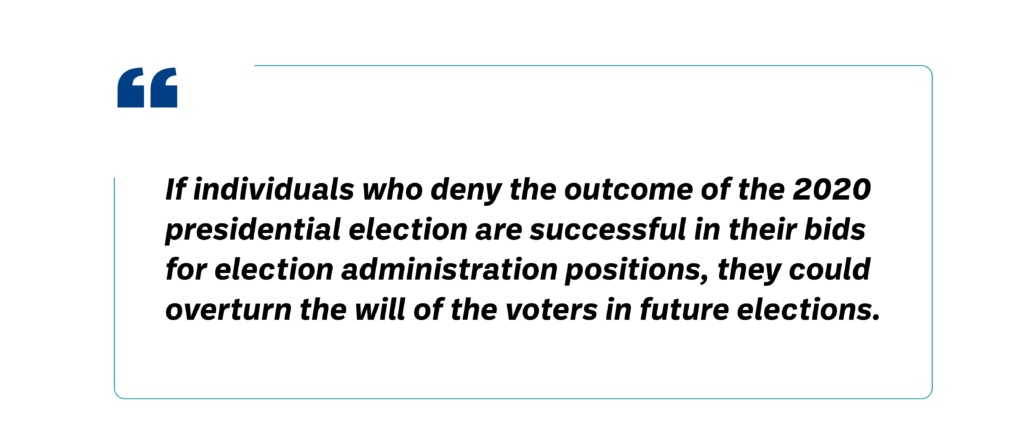
Some of the money flowing into these races may have flowed regardless of the new attention on these officials and election administration — such as business executives or corporate PACs with interests in how a secretary of state can affect the business climate in state.
Yet election-denying secretary of state candidates appear to be raising more money than similar candidates in the past because of the efforts of some political actors to turn election operations over to partisans.
This report highlights a dozen notable donors to election-denying secretary of state candidates, including how much they have given to date to the candidates they have backed.
Former President Donald Trump’s Save America PAC
- $7,000 to Jody Hice, who unsuccessfully ran for secretary of state in Georgia
- $5,000 to Mark Finchem, GOP nominee for secretary of state in Arizona
- $5,000 to Kristina Karamo, GOP nominee for secretary of state in Michigan
Formed just days after he lost the presidential election, former President Donald Trump’s PAC — known as Save America PAC — has raised more than $135 million since November 2020, often through the use of aggressive, alarmist, and misleading fundraising pitches. A portion of the money this PAC has raised has gone to support candidates and groups that Trump views as allies, including some candidates running for the position of secretary of state who have echoed Trump’s lies about the integrity of the 2020 election. While Save America PAC has not donated to every secretary of state candidate that Trump has endorsed, according to the most recent campaign finance filings, the PAC still had roughly $93 million in the bank as of Aug. 31.
Patrick Byrne
- $5,000 to Jim Marchant, GOP nominee for secretary of state in Nevada
- $2,900 to Kristina Karamo, GOP nominee for secretary of state in Michigan
- $1,000 to Tina Peters, who unsuccessfully ran for secretary of state in Colorado
Patrick Byrne — the founder and former CEO of online retailer Overstock.com — is one of the leading figures in the election denier movement. Long an ally of Trump, Byrne stepped down as the CEO of Overstock.com in 2019 after his affair with an alleged Russian spy came to light. In December 2020, Byrne attended a meeting at the White House about the ways in which Trump might contest the election. Byrne also financed a film called “The Deep Rig,” which promotes false claims about the 2020 election. He promoted the film this summer with events featuring former Trump National Security Advisor Lt. Gen. Michael Flynn and Republican strategist Roger Stone.
In addition to the contributions that Byrne has directly made to election denier secretary of state candidates, a nonprofit that he co-founded and funds — called The America Project — has provided nearly half of the $347,000 raised to date by a PAC led by Nevada GOP Secretary of State candidate Jim Marchant that is boosting election denier secretary of state candidates across the country. Marchant announced this effort by his Conservatives for Election Integrity PAC in October 2021 at a conference in Las Vegas held by QAnon conspiracy theorists.
Richard Uihlein
- $7,000 to Jody Hice, who unsuccessfully ran for secretary of state in Georgia
- $5,000 to Jim Marchant, GOP nominee for secretary of state in Nevada
Richard Uihlein is an ultra-wealthy American businessman and founder of shipping supply company Uline. Along with his wife, Elizabeth, the Uihleins were once dubbed “the most powerful conservative couple you’ve never heard of” by the New York Times. Uihlein has also given money to conservative groups that organized pro-Trump rallies after the 2020 election, including a number of groups that were present at the pro-Trump rally outside the White House on Jan. 6, 2021.
Lewis & Margaret Topper
- $15,000 to Jody Hice, who unsuccessfully ran for secretary of state in Georgia
- $9,300 to Mark Finchem, GOP nominee for secretary of state in Arizona
- $5,000 to Kristina Karamo, GOP nominee for secretary of state in Michigan
- $2,900 to Jim Marchant, GOP nominee for secretary of state in Nevada
- $2,500 to Tina Peters, who unsuccessfully ran for secretary of state in Colorado
Lewis Topper is a fast food restaurateur, operating Wendy’s franchises for 30 years. WendCentral, the company of which he is the chairman and CEO, is the largest Wendy’s franchisee in the country, with more than 300 locations. He and his wife Margaret live in Florida. Last year, Lewis Topper reportedly met with Trump at Trump’s golf course in New Jersey.
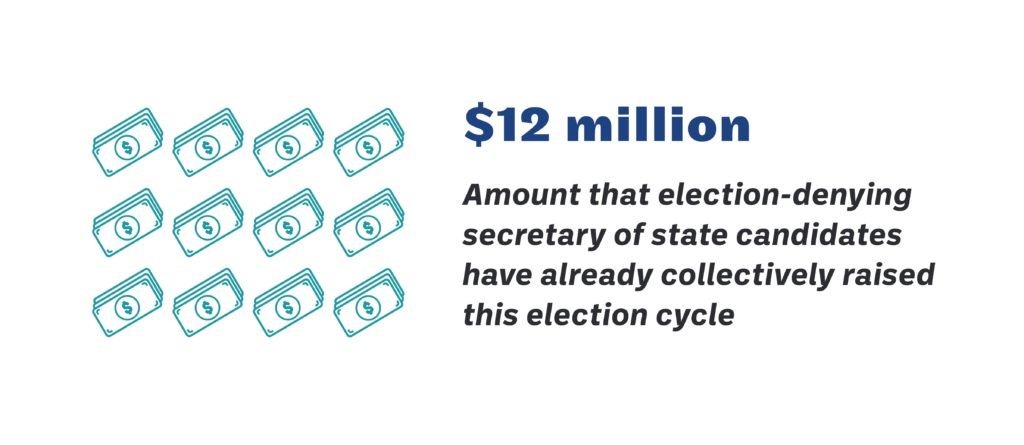
Norman Rogers
- $10,000 to Jim Marchant, GOP nominee for secretary of state in Nevada
- $1,000 to Rachel Hamm, who unsuccessfully ran for secretary of state in California
Norman Rogers is a retired physicist and entrepreneur who lives in Las Vegas. He is a policy adviser at the conservative Heartland Institute. In addition to his direct contribution to election-denying secretary of state candidates, Rogers has also contributed $5,000 to Nevada GOP Secretary of State candidate Jim Marchant’s Conservatives for Election Integrity PAC, which has supported Marchant and other election denier candidates running this year.
Mike Rydin
- $12,000 to Jody Hice, who unsuccessfully ran for secretary of state in Georgia
Mike Rydin is the founder and former CEO of a construction software company in Texas called HCSS. Rydin is also a supporter of the Conservative Partnership Institute, a pro-Trump nonprofit whose leaders include former Sen. Jim DeMint (R-SC) and former Trump White House Chief of Staff Mark Meadows. Former Trump attorney Cleta Mitchell, who was on the phone with Trump when he pressured Georgia Secretary of State Brad Raffensperger to “find” the votes necessary for him to win Georgia, also leads an election-related project at the Conservative Partnership Institute. Rydin helped the Conservative Partnership Institute purchase a $1.5 million townhouse in Washington, D.C., according to records reviewed by Grid News, and for his financial support of this project, the Conservative Partnership Institute named the property the “Rydin House.”
Brian T. Kennedy
- $5,000 to Mark Finchem, GOP nominee for secretary of state in Arizona
Brian T. Kennedy is the president of American Strategy Group, a nonprofit that says it is focused on responding to “the existential threats” posed to the United States and Western civilization by “the Islamic world, Russia, China, and the loss of America’s founding principles.” Kennedy is also the former president of — and a senior fellow at — the Claremont Institute, a conservative think tank that also employs John Eastman, the lawyer who penned the infamous memos urging then-Vice President Mike Pence to reject some state’s official electoral votes. Kennedy has supported investigations into the 2020 presidential election, for instance, calling the election a “fraud” during a November 2020 podcast interview with former Trump strategist Steve Bannon.
Michael Marsicano
- $5,300 to Mark Finchem, GOP nominee for secretary of state in Arizona
Michael Marsicano is a small businessman, former mayor of Hazleton, Pennsylvania, and three-time failed congressional candidate. In 2016, Marsicano unsuccessfully ran for Congress as a Democrat, and in 2020 and 2022, he unsuccessfully ran for Congress as a Republican. He has cited his support for Trump among the reasons he left the Democratic Party in 2019.
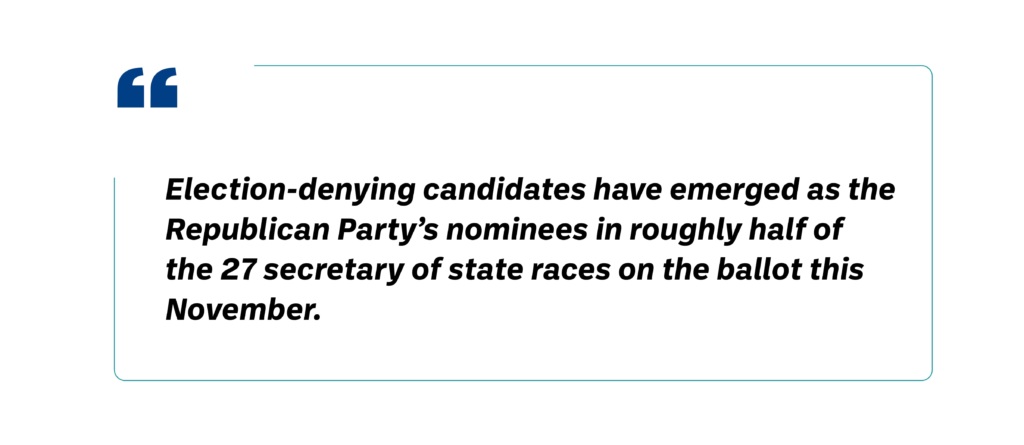
Ron Cameron
- $5,000 to Jody Hice, who unsuccessfully ran for secretary of state in Georgia
- $2,900 to Eddie Williams, who unsuccessfully ran for secretary of state in Arkansas
Ron Cameron is the CEO of Mountaire Farms, a company founded in Arkansas in 1914 that is now one of the largest poultry companies in the United States. Cameron is a major conservative donor and generally likes to keep a low public profile. He has long been a staunch ally of Trump, who appointed him to serve on a White House advisory board on the COVID-19 pandemic’s economic impact.
Alan Blair
- $4,455 to Mark Finchem, GOP nominee for secretary of state in Arizona
- $4,255 to Kristina Karamo, GOP nominee for secretary of state in Michigan
- $2,550 to Jody Hice, who unsuccessfully ran for secretary of state in Georgia
- $1,525 to Tina Peters, who unsuccessfully ran for secretary of state in Colorado
- $750 to Audrey Trujillo, GOP nominee for secretary of state in New Mexico
- $350 to Diego Morales, GOP nominee for secretary of state in Indiana
- $250 to Jim Marchant, GOP nominee for secretary of state in Nevada
- $25 to Dominic Rapini, GOP nominee for secretary of state in Connecticut
Alan Blair lives in northern Virginia, works in the IT industry as a senior data/enterprise/cloud architect, and has a top secret security clearance, according to his LinkedIn profile. Campaign finance records show that he has contributed to several secretary of state candidates this cycle — including many of the election deniers that have been endorsed by Nevada GOP Secretary of State candidate Jim Marchant’s Conservatives for Election Integrity PAC.
Mark W. Hennessy
- $7,600 to David Belle Isle, who unsuccessfully ran for secretary of state in Georgia
Mark W. Hennessy participated in the 2020 fake elector scheme, as one of 16 Georgia Republicans who signed a letter certifying that Trump had won the state after Biden carried it by roughly 12,000 votes. Hennessy is the CEO of multiple car dealerships in the Atlanta area.
Marian Sheridan
- $700 to Kristina Karamo, GOP nominee for secretary of state in Michigan
Marian Sheridan participated in the 2020 fake elector scheme, as one of 16 Michigan Republicans who signed a letter certifying that Trump had won the state after Biden carried it by 154,000 votes. Sheridan is the co-founder of the Michigan Conservative Coalition, a group of pro-Trump Republicans that falsely claimed online that the Jan. 6, 2021, attack on the Capitol was staged. She is also the grassroots vice chair of the Michigan Republican Party, director of the Lakes Area Tea Party, and executive board member for the Oakland County Republican Party. She has helped train hundreds of poll challengers.
Note: As a 501(c)(3) public charity, Issue One does not endorse candidates or advocate for the election or defeat of candidates.
